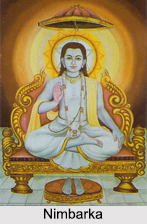 Nimbarka was one of the popular Vaishnava philosopher and mystics in India. He was one of the five principal commentators on Badarayana"s Brahma Sutra. Nimbarka was also the first Vedantic saint who became successful to systematically propound the five main schools of Vedanta.
Nimbarka was one of the popular Vaishnava philosopher and mystics in India. He was one of the five principal commentators on Badarayana"s Brahma Sutra. Nimbarka was also the first Vedantic saint who became successful to systematically propound the five main schools of Vedanta.
Nimbarka was born in a Telugu Brahmin family in the 11th century A.D. There is a popular myth that Sri Nimbarkacharya is actually an incarnation of Lord Hari"s most important weapon, named the "Sudarshana Chakra" or discuss.
Teachings of Nimbarka
The great saint, Nimbarka was also known by the names Aruna Rishi and Haripriyacharya and he was the founder of a new and separate sect, named "Nimandi". According to him, the highest reality (Brahma) is the personal God and he is also beyond limits. He propagated that Brahma is omnipotent and omniscient and apart from creating man"s soul (jiva), he has close association with the individual soul as well. Nimbarka advocated the idea that salvation can be achieved only through the right kind of knowledge regarding Brahma, meditation and self-surrender to God and also through Karma that is performed not for any selfish gain. The philosophy of Nimbarka is quite popular as `dvaita-advaita` (dualistic non-dualism).
Philosophy of Nimbarka
His philosophy is known as Dvaitadvaita (duality and nonduality simultaneously). According to him, there are three categories of existence chit, achit and Ishwara. According to Nimbarka, the relation between Brahman and the souls and universe is a relation of natural difference-non-difference. There are three equally real and co-eternal realities: Brahman, the chit and the achit. Brahman is considered as the Controller, the chit is believed to be the enjoyer and the achit is the object enjoyed.
Nimabarka refers to five types of Sadhanas:
1. Karma (ritual action): Karma is performed in a proper spirit thus giving rise to knowledge which is a means to salvation.
2. Vidya (knowledge): Vidya is not a subordinate factor of karma. However it is not an independent means for everyone. It is only for those inclined to spending vast lengths of time in scriptural study.
3. Upasana or dhyana (meditation): There are three types of meditation: meditation on the Lord as one`s self, meditation on the Lord as the Inner Controller and lastly is the meditation on Lord Himself.
4. Prapatti (Surrender to the Lord/Devotion): Prapatti is the devotion and self surrender to God. This contains elements of all the other means and is available to all.
5. Gurupasatti: This is devotion and self surrender to guru. It is realised as a part in Prapatti, and not as an independent means.









